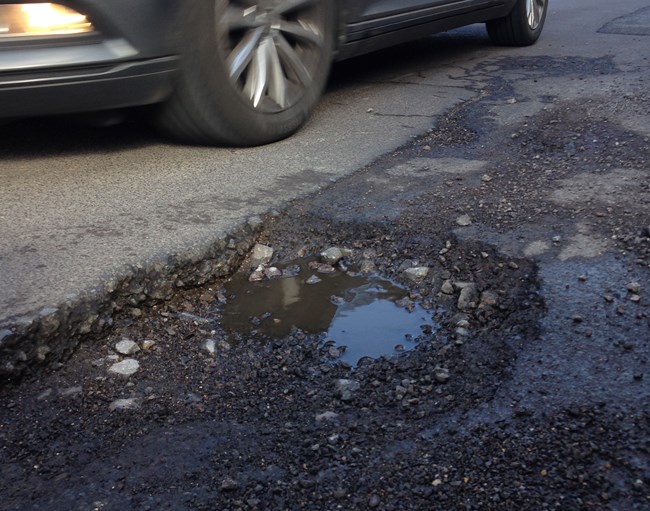- ETRUX launches new Ford E-Transit Trizone
- Renault gives UK debut to Master E-Tech at CV Show
- Isuzu D-Max long-term test – Latest Report
- Isuzu D-Max V-Cross Steel Edition revealed
- IVOTY Report: Stellantis explores the hydrogen proposition
- New Maxus EVs include eDeliver 5 van
- Used LCV values reach six-month high
- ADVERTISEMENT FEATURE: IVECO Daily Mission Awards 2024 Q2 Round-up: Grounds Maintenance & Forestry
- Stellantis Pro One electric vans review
- Mitie adds 5,000th EV to fleet
RAC data suggests increase in potholes on UK roads
Date: Friday, January 14, 2022 | Author: Sean Keywood

RAC patrols attended an increased number of pothole-related breakdowns last year.
The breakdown organisation said there were 10,123 call-outs for broken suspension springs, distorted wheels, and damaged shock absorbers – equivalent to 27 per day, and the most in a year since 2018.
It was also a 10% increase on 2019 and a 19% increase on 2020, and accounted for 1.5% of all RAC call-outs last year, compared with 1.2% in 2020, 1.1% in 2019, and 1.4% in 2018.
The RAC’s Pothole Index, which takes account of breakdown statistics and weather data to assess the condition of UK roads, now stands at 1.63, up from 1.48 at the end of September, meaning drivers are more than one-and-a-half times more likely to break down after hitting a pothole today than when the organisation began collecting the data back in 2006.
RAC head of roads policy Nicholas Lyes said: “The rot appears to have well and truly set in when it comes to the country’s roads with our patrols going out to vast numbers of drivers who, through no fault of their own, are breaking down because of the wear-and-tear caused by potholes. This is ridiculous because it is almost entirely avoidable if roads were maintained properly. With drivers contributing so much in terms of tax to the government the very least they deserve are roads that are fit-for-purpose.
“Potholed roads are a menace, not a mere annoyance – they can cause thousands of pounds of unnecessary damage to drivers’ vehicles, make using our roads uncomfortable and can be a serious road safety hazard for anyone on two wheels.
“It’s hard to see how the status quo is sustainable. Inevitably we have plenty of cold weather still to come this winter and we fear that by the spring the number of drivers running into problems will rise even further. Not getting our roads into a decent shape is simply storing up more problems – and more expense – for the future.”
Lyes said local council needed to be given funding to improve road surface standards.
He said: “Clearly, promises of one-off pots of cash from the government to fix the problem haven’t done the trick and we urgently need some fresh thinking.
“Ring-fencing a proportion of existing taxation and earmarking these funds purely for local roads over a long-term period would give councils the financial confidence they need to plan their road maintenance work, and finally break the back of this age-old problem.”
View The WhatVan Digital Edition


